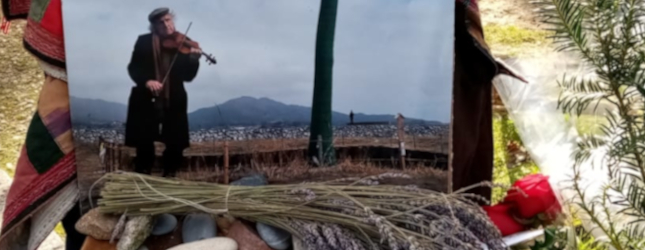Ivry Gitlis (1922-2020) - last farewell to the great artist
Ivry Gitlis, one of the brilliant virtuosos and violin teachers, passed away on December 24, 2020
on a rainy, cloudy Parisian day.
He joined the musical parnass orchestra, finding his old mentors (Bronisław Huberman, who had drawn attention to the gifted child and after having heard his concert performance advised him to enter the Paris Conservatory), teachers (Enesco, Heifetz, Flesch and Jules Boucherit) and friends (Isaac Stern, who said about him "he is the greatest of us", Ida Handel and Ginette Neveu). After almost a hundred years (1922-2020) of his Earth's journey he will be seated at one of the music stands there. He had passed away while listening to music...
Vinh Pham, touched and greatly moved, kept vigil of his master and friend, playing his favorite pieces for several hours: from Bach, through Enesco to Manuel de Falla. «I had the impression that Ivry had already started his journey of "dans l'au-delà", though fully conscious. He even tried to answer the phone. When I picked up my violin, asking if he wanted me to play something, he nodded a few times with his usual energy. At one point, when I got very close, looking at him in the eye and playing a fragment of "La vida breve" of de Falla, Ivry smiled to me, happy looked ahead with "bright" eyes, although his face, so tired, was devoid of its old expression. «He passed away on Thursday at eight o'clock in the morning, calm, with a smile on his face...»
We said goodbye to the exceptional musician on December 30 at Père Lachaise, in the rays of the winter sun, with a ceremony that would surely be close for the artist with its atmosphere and spirit. In a small group ("COVID oblige") of family, friends, students and admirers we listened to music (members of the "Sirba octet", a cellist Michel Strauss and Vinh, faithful to the last minute), prayers, memories and Jewish humor, and even recordings of Ivry's voice with a melody in a specific scatt - crying and laughing alternately.
Behind the covid masks, the eyes of Khatia Buniatishvili (she made a beautiful and warm speech about the artist), Maxim Vengerov (the chairman of two editions of the International Henryk Wieniawski Violin Competitions in Poznań in 2011 and 2016), David Stern (a son of Issac, an excellent musician and conductor), Leonid Kerbel (who is also known to Poznań city and the Henryk Wieniawski Music Society of Poznań as one of the jurors of the 15th Competition), Bruno Monsaingeon (the director of well-known and recognized movies about music and dance, such as «L'Art du violon»: The Art of the Violin), Jean-Michel Molkhou (a long-time friend, critic and author of the book« Les grands violonistes du XXe siècle », who amused everyone with anecdotes from the artist's life).
Everyone who made a speech (including the rabbi who spoke beautifully and truthfully with simplicity about him) agreed with the unique sound of his violin performance, difficult sometimes even unbearable character (which, however, did not prevent anyone from loving and admiring him), and specific way of being and living (his apartment had been compared to Capernaum - full of souvenirs, posters, photos and stones from all over the world). One can easily imagine the atmosphere in a Parisian cemetery that Gitlis would undoubtedly like, who was also characterized by a constant search for answers to the questions that he kept asking his life and the world: completely insatiable, ready to learn to understand.
"How one can you talk about death if your story is still being written", the artist's granddaughter said with great emotion.
On air of «France Musique» the artist was mentioned:
- French violinist Renaud Capuçon: "Ivry Gitlis had this power to move us to tears after three notes played",
- Jean-Michel Molkhou: «You can recognize his style after just two bars. He is one of those violinists whose sound, specific freedom and the way of playing with the bar line were like a signature. He had an exceptionally strong personality and he always admitted it»,
- Frédéric Lodéon (a cellist, a music journalist and a friend on stage and television) emphasized Gitlis's humanism: “He wanted to live for the reconciliation of Israel and Palestine. He was a citizen of the world».
Iza Bauer-Confrere
transl. Katarzyna Kułagowska Silva
Ivry Gitlis (1922-2020) - les adieux à grand artiste
Ivry Gitlis, un des virtuoses et des pédagogues de violon de génie, nous a quitté le 24 décembre
pendant une pluvieuse et nuageuse journée parisienne.
Il a agrandi l’orchestre du parnasse musical, où il a retrouvé ses anciens mentors (comme Bronislaw Huberman, qui a remarqué l’enfant prodige lors d’un concert et lui a conseillé le Conservatoire de Paris), ses pédagogues (Enesco, Heifetz, Flesch ou Jules Boucherit) et ses amis (Isaac Stern, entre autres, qui aurait dit de lui, «c’est le plus grand de nous tous», Ida Haendel ou Ginette Neveu). Il va s’y asseoir à l’un de pupitres à la fin de son parcours terrestre de près d’un siècle (1922-2020). Il est parti en écoutant de la musique…
Vinh Pham, affecté et très ému, a veillé son maître et ami jouant pendant des heures ses œuvres préférées: de Bach, par Enesco à Manuelle de Falla. «J’ai eu l’impression qu’Ivry a déjà commencé son voyage vers l’au-delà, mais pleinement conscient. Il a même essayé de décrocher le téléphone. Quand j’ai sorti mon violon, lui demandant s’il souhaitait que je joue quelque chose, il a fait signe de la tête avec son énergie habituelle. A un moment, en lui jouant les yeux dans les yeux «La vie brève» de de Falla, je voyais clairement qu’Ivry me souriait, heureux, son regard s’était «allumé», même si son beau visage, assez altéré, ne bougeait plus comme avant. Il s’est «envolé» le jeudi, à huit heure du matin, serein, apaisé, avec le sourire aux lèvres…»
Nous avons fait nos adieux à ce musicien d’exception le 30 décembre au Père Lachaise, dans les rayons du soleil d’hiver, dans une cérémonie qui, par son esprit et son ambiance, lui aurait été particulièrement proche. En comité restreint (covid oblige), avec sa famille, ses amis, ses élèves et admirateurs, nous écoutions de la musique (les membres de «Sirba octet», le violoncelliste Michel Strauss et, fidèle jusqu’au dernier moment, Vinh), la prière, des souvenirs, de l’humour juif et même l’enregistrement de la voix d’Ivry (une mélodie en scat particulier), en alternant le rire et les larmes.
De derrière les masques regardaient, entre autres, les yeux très émus de Khatia Buniatishvili (qui a livré un beau et chaleureux témoignage de l’artiste), de Maxim Vengerov (président du jury des deux dernières éditions 2011 et 2016 du Concours International de Violon Henryk Wieniawski de Poznan), de David Stern (fils d’Isaac, célèbre musicien et chef d’orchestre), de Leonid Kerbel (connu également à Poznan comme l’un des membres du jury de la 15e édition du Concours), de Bruno Mansaingeon (réalisateur des célèbres et très appréciés films sur la musique et la danse, comme «L’Art du violon») de Jean-Michel Molkhou (ami de longue date, critique et auteur du livre «Les grands violonistes du XXe siècle», qui a égayé l’atmosphère avec des anecdotes de la vie de l’artiste).
Tous ceux qui ont pris la parole (y compris la femme rabbin qui a évoqué le musicien de façon admirable, avec simplicité et en vérité), étaient d’accord quant au son, tellement exceptionnel de l’artiste, son difficile et même insupportable caractère (qui n’a empêché personne de l’aimer et de l’admirer), sa manière de vivre si particulière (son appartement était un capharnaüm, plein de souvenirs, de posters, de photographies et de pierres du monde entier). On peut imaginer sans problème l’atmosphère au cimetière parisien, laquelle aurait sans aucun doute plu à Gitlis - en quête éternelle de réponses, posées au monde et à la vie, toujours prêt à apprendre pour comprendre.
«Comment parler de la mort quand ton histoire s’écrit toujours» a dit, avec une grande émotion, l’une des petites filles de musicien.
A l’antenne de "France Musique" ont évoqué le souvenir de l’artiste:
- le violoniste Renaud Capuçon: «Ivry Gitlis avait ce pouvoir de vous émouvoir aux larmes en trois notes»
- Jean-Michel Molkhou: «On reconnaît Ivry en deux mesures. Il fait partie des violonistes dont le son, la liberté, la façon de jouer avec les barres de mesure étaient une signature. Il avait une identité extrêmement forte et il l’a toujours revendiqué».
- Frédéric Lodéon (violoncelliste, journaliste musical et l’ami de la scène et des plateaux de télévision), pointe du doigt l’humanisme de Gitlis: «Il voulait voir la réconciliation entre Israël et La Palestine…C’était un homme du monde».












